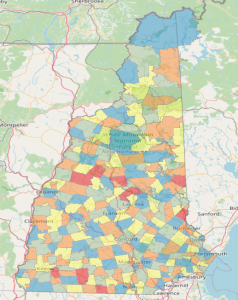Navigating New Hampshire: A Guide to Zip Code Maps
Related Articles: Navigating New Hampshire: A Guide to Zip Code Maps
Introduction
With great pleasure, we will explore the intriguing topic related to Navigating New Hampshire: A Guide to Zip Code Maps. Let’s weave interesting information and offer fresh perspectives to the readers.
Table of Content
- 1 Related Articles: Navigating New Hampshire: A Guide to Zip Code Maps
- 2 Introduction
- 3 Navigating New Hampshire: A Guide to Zip Code Maps
- 3.1 Understanding the Significance of Zip Codes
- 3.2 Exploring New Hampshire’s Zip Code Landscape
- 3.3 Navigating the Map: Key Features and Considerations
- 3.4 Benefits of Using a Zip Code Map
- 3.5 FAQs: Addressing Common Questions
- 3.6 Tips for Effective Use of Zip Code Maps
- 3.7 Conclusion: The Importance of Zip Code Maps in Modern Life
- 4 Closure
Navigating New Hampshire: A Guide to Zip Code Maps

New Hampshire, the Granite State, boasts a diverse landscape, from bustling cities to charming towns and serene natural wonders. Understanding its geography becomes crucial when navigating its various services, businesses, and communities. Zip code maps serve as invaluable tools for this purpose, providing a clear visual representation of the state’s postal code system.
Understanding the Significance of Zip Codes
Zip codes, or Zone Improvement Plan codes, are five-digit numerical codes assigned to specific geographic areas within the United States. These codes play a critical role in the efficient sorting and delivery of mail by the United States Postal Service (USPS). In addition to postal services, zip codes are widely used for:
- Locating Businesses and Services: Zip code maps allow users to quickly identify the location of businesses, restaurants, medical facilities, and other services within a particular area.
- Targeting Marketing Campaigns: Businesses leverage zip code maps to target their marketing efforts to specific geographic regions, ensuring their messages reach the most relevant audience.
- Analyzing Demographic Data: Zip codes are often used in conjunction with demographic data to understand the characteristics of specific populations, aiding in various planning and research initiatives.
- Emergency Response: Emergency responders utilize zip codes to quickly locate the source of calls for service, ensuring timely and efficient assistance.
- Real Estate Transactions: Zip codes play a vital role in real estate transactions, providing a standardized system for identifying and locating properties.
Exploring New Hampshire’s Zip Code Landscape
New Hampshire’s zip code map reflects the state’s unique geographic features, with distinct areas defined by their postal codes. The state’s diverse landscape, encompassing mountains, forests, lakes, and coastal regions, is reflected in the distribution of zip codes.
- Urban Centers: Larger cities like Manchester, Nashua, and Concord have multiple zip codes, reflecting their diverse neighborhoods and business districts.
- Rural Communities: Smaller towns and villages often share a single zip code, reflecting their close-knit nature and common postal services.
- Remote Areas: Areas with low population density or challenging terrain may have fewer zip codes, reflecting the limited need for extensive postal services.
Navigating the Map: Key Features and Considerations
When using a zip code map of New Hampshire, several key features and considerations are crucial for effective navigation:
- Legend: The map legend explains the symbols, colors, and other visual cues used to represent different areas and information.
- Scale: The scale of the map indicates the relationship between distances on the map and actual distances on the ground.
- Zoom Functionality: Interactive zip code maps often offer zoom functionality, allowing users to focus on specific areas of interest.
- Search Functionality: Many online maps provide search functionality, enabling users to find specific addresses, zip codes, or points of interest.
- Data Updates: It is important to ensure that the map being used is up-to-date, as zip code boundaries can change over time.
Benefits of Using a Zip Code Map
Utilizing a zip code map offers numerous benefits, including:
- Enhanced Efficiency: Zip code maps facilitate quick and easy location identification, saving time and effort in various tasks.
- Improved Accuracy: The precise boundaries defined by zip codes provide a more accurate representation of geographic areas compared to general maps.
- Enhanced Decision Making: By understanding the demographics and characteristics of specific zip code areas, individuals and organizations can make informed decisions regarding their activities and investments.
- Increased Accessibility: Online zip code maps are readily accessible from any device with an internet connection, making them convenient and user-friendly.
FAQs: Addressing Common Questions
Q: What is the difference between a zip code and a postal code?
A: In the United States, the terms "zip code" and "postal code" are often used interchangeably. Both refer to the five-digit numerical code assigned to specific geographic areas for mail delivery.
Q: How can I find the zip code for a specific address in New Hampshire?
A: You can use online tools such as the USPS website or online mapping services like Google Maps to find the zip code for a specific address.
Q: Are zip codes always accurate indicators of a location’s characteristics?
A: While zip codes provide a general indication of location, they do not always accurately reflect the specific characteristics of an area. For instance, a single zip code may encompass a diverse range of neighborhoods with varying demographics and socioeconomic profiles.
Q: How often do zip code boundaries change?
A: Zip code boundaries are relatively stable but can change over time due to population growth, development, or changes in postal service requirements.
Tips for Effective Use of Zip Code Maps
- Choose a reliable source: Utilize reputable online mapping services or official sources like the USPS website for accurate and up-to-date zip code information.
- Consider the purpose: Identify the specific information you need from the map, such as locating a business, understanding demographics, or finding an address.
- Use search functionality: Take advantage of search features to quickly find specific locations or zip codes.
- Zoom in for detail: Zoom in on areas of interest to get a more detailed view of zip code boundaries and locations.
- Check for updates: Ensure that the map you are using is current, as zip code boundaries can change over time.
Conclusion: The Importance of Zip Code Maps in Modern Life
Zip code maps serve as essential tools for navigating New Hampshire’s diverse landscape and connecting its communities. Whether for personal use, business operations, or research purposes, these maps provide a valuable resource for understanding geographic boundaries, locating services, and making informed decisions. By embracing the power of zip code maps, individuals and organizations can enhance their understanding of New Hampshire’s unique geography and navigate its vibrant communities with greater ease and efficiency.








Closure
Thus, we hope this article has provided valuable insights into Navigating New Hampshire: A Guide to Zip Code Maps. We thank you for taking the time to read this article. See you in our next article!